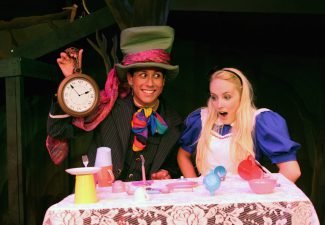The Lyceum Theatre’s rendition of “Lord of the Flies” had people buzzing in its opening weekend. With the demonic undertones and a twisted depiction of humanity, it offered an unforgettable experience for the entire audience, because this production was different from others. This production featured a mostly female cast, with the story told in a “gender-neutral” point of view. While the show was moving and the performances gripping, the gender-neutral goals seemed to fall short.
“Lord of the Flies” is originally an all-male cast; however in Vanguard’s production, only four out of the 13 characters were actually male. In a note to patrons, director Susan Berkompas explained her take on the book, proposing that the character flaws of humanity extended to both male and females. Berkompas chose to tell the story through a gender-neutral point of view in a modern, present day telling.
The essence of the play follows a rag-tag group of 13 young boys that crash land on a tropical island and must learn to survive until they can be rescued. This was a bit confusing because Berkompas’s goal was to make the play gender neutral, yet she still labeled all of the characters as males. Following their efforts for survival, the play shows the characters’ inner battles to keep their humanity and shows just how destructive isolation can be as they hunt for the elusive “beast” that inhabits their island.
To portray this slip of the characters’ humanity, the production takes full advantage of lighting on stage. During the more dark, evil scenes, the red lighting gave off a chilling, eerie effect. The lighting designer, Garret Spady, did an incredible job capturing the haunting tone of the characters and spreading that to the whole stage.
The character Jack was the main example for this erosion of humanity and was probably the most unlikeable (just overall terrible, really) character I have ever encountered. Throughout the whole production, I was wishing that his character was going to be killed off. So a special congratulations is in order for sophomore Zachary Guevin, who is so talented that he was able to portray a character that I hated with every fiber of my being. He completely captured the essence of snobbery and evil.
The cast was full of other great actors, such as freshman Robert Ball, who played the lead character of Ralph, junior Alondra Lucatero who portrayed Simon, and freshman Isaiah Nuno as Piggy. Every actor helped give a moving performance, but these three completely encompassed their roles.
Simon’s breakdown was beautifully executed: Lucatero’s character was moving and sympathetic from the moment she walked on stage. Despite Piggy losing his speech impediment partway through the first act, he was arguably the most likable character, and Nuno’s execution of the last scene was expertly timed and admittedly got me very emotional. Piggy’s and Ralph’s friendship was easily my favorite aspect of the play. Ball did an amazing job of portraying real, sympathetic characters whose emotions were felt by every patron.
And yet, there were some confusions within directing choices. Despite the program saying that the play took place in present day, there were no obvious changes to the story to make it appear to be. If I hadn’t read the program, I would have no clue that the setting was present day on a tropical island. There is also the issue of the characters supposedly being British, yet none of them have a British accent. It was a bit confusing to have the line about them being “British boys” when none of them had British accents and the majority of them were obviously female.
It was a little off-putting to have all of the characters be addressed as boys when the girls were obviously girls. Lucatero was the only female “male” character that even slightly resembled a boy. If they wanted them all to be boys, the other female actors should have been made to look more boyish, but since they weren’t, the actors came across as awkward when being addressed as boys.
If it truly was a modern, present day take on “Lord of the Flies,” where the whole message was based around how females are susceptible to evil and corruption too, why not just completely gender-bend the characters? The production could have been that much more powerful if the female actors were explicitly portraying female characters.
And yet through all this, patrons were fascinated by the cast’s incredible ability to depict humanity’s corruption and were moved by the powerful ending. The mostly female rendition of “Lord of the Flies“ offered a unique story whose overall impact was quite powerful, yet could have been even more so if they made the full transition into a modern take on the story.

 Is Anyone Watching Award Shows?
Is Anyone Watching Award Shows? Don’t be late for this very important date: ‘Alice’
Don’t be late for this very important date: ‘Alice’ Blame it on the Movies!
Blame it on the Movies! ‘What a Firm Foundation’: Worship Band on Tour
‘What a Firm Foundation’: Worship Band on Tour
Leave a Reply